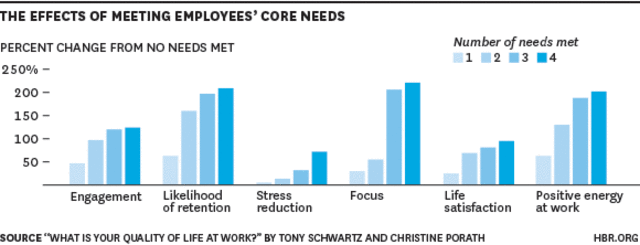If you’re pulling long hours and lament your lack of a life outside work, it’s very likely that you’re modeling the behavior of your boss.
If you’re feeling overworked, your boss could be to blame, but not for giving you extra work or telling you to stay late. Results from an online survey of 19,000 employees around the world confirm that an employee’s ability to balance work and personal life is affected heavily by her boss’s bad habits.
In other words: Monkey see, monkey do.
The study and findings were created and collected by Christine Porath, associate professor at Georgetown University’s McDonough School of Business, and Tony Schwartz, president and CEO of The Energy Project.
They first identified four metrics that make up an employee’s “core needs”:
- physical renewal
- emotional value
- focus
- purpose
When even one of these four needs is met, workplace satisfaction and performance improve.

If your workplace feels more like a corporate jungle than part of civilized society, remember the baboons, Schwartz and Porath say: They look to an alpha primate for guidance and reassurance once every 20 or 30 seconds. Humans aren’t so different.
From their findings, most bosses are setting a bad example:
Unfortunately, only 25% of our survey respondents told us that their leaders model sustainable work practices. Those leaders’ employees are 55% more engaged, 72% higher in health well being, 77% more satisfied at work, and 1.15 times more likely to stay at the company. They also reported more than twice the level of trust in their leaders.
If your boss works long hours, there is likely little you can do to change their behavior. Hopefully this awareness of their unconscious decisions might help you assert your right to leave at a more reasonable hour. It’s also so a good idea to talk to your boss about the expectations for your job, chances are they might not realize the stress they are causing.
On the other hand, if you’re the boss and this sounds familiar, you can improve your employees’ work-life balance by making yours better, too:
Be mindful of email after-hours
Sending emails late at night or on the weekends sets the bar high. You might feel more productive from home at 11 p.m., but that doesn’t mean your employees appreciate their inbox buzzing all night long.
Leaders told Schwartz and Porath that they don’t necessarily expect action on these after-hours emails, but it’s “a near guarantee that their direct reports will feel compelled to read and respond to them.”
Let them focus during the day
Only 21% of respondents said they were able to focus on one thing at a time during the day. Again, even if you don’t expect immediate action on requests or memos, employees feel obligated to act immediately–breaking their workflow concentration.
Be clear about what you need, when you need it, and how it fits into the big picture. Having leaders who communicate a clear, inspiring vision for others to follow resulted in an impressive 82% higher job satisfaction and had employees that were more likely to stick around. But only 22% of respondents reported having that kind of leadership.
Show your appreciation
Don’t be stingy with praise or constructive feedback; feeling valued by their bosses meant more productivity and loyalty. “Only 36% of our respondents said they felt a high level of meaning and significance at work,” the researchers reported. “Those who did were more than three times as likely to stay at their companies–the highest single correlation in our study.”
via How Your Boss’s Work-Life Balance Affects Yours | Fast Company | Business + Innovation.
How Your Boss"s Work-Life Balance Affects Yours
